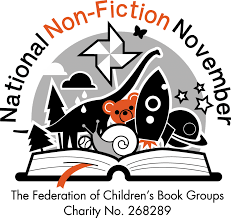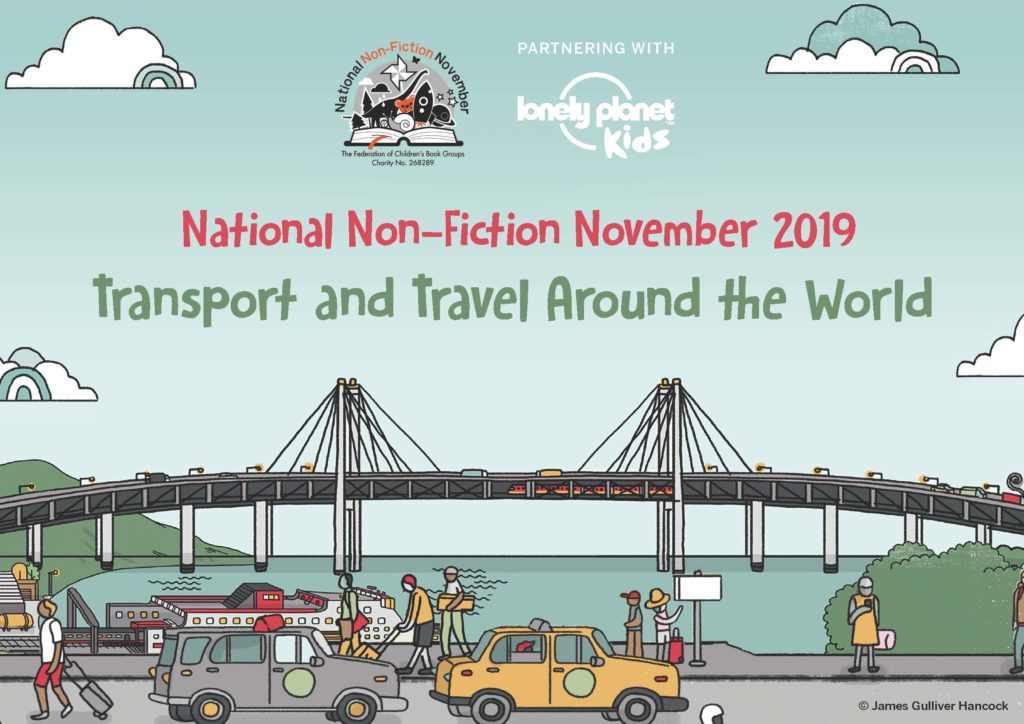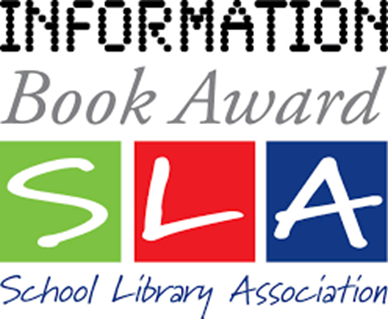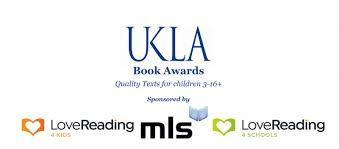

November is not generally a month considered worth celebrating beyond Guy Fawkes Day and after all the excitement of Halloween but in the world of children’s books and school libraries it certainly is because it is National Non-Fiction November.
This is the Federation of Children’s Book Groups’ annual celebration of all things factual. Born out of National Non-Fiction Day, the brain child of school librarian Adam Lancaster, during his years as national Chair of FCBG, the whole month now celebrates all those multitudes of readers that have a passion for information and facts and attempts to bring the celebration of outstanding non-fiction books more in line with those of fiction.
Each year FCBG chooses a theme and develops resources and competitions linked to the theme which, in 2019, is Travel and Transport Around the World. The ideas suggested for their regional book groups would lend themselves equally well to classroom literacy activities, after school clubs or themed library lessons. http://fcbg.org.uk/wp-content/uploads/NNFN-Ideas-for-Transport-and-Travel-Events.pdf. There are also downloadable posters, bunting and bookmarks to help you get creative with display and an excellent booklist of exciting nonfiction about all aspects of travel and transport http://fcbg.org.uk/wp-content/uploads/NNFN-Book-List-2019.pdf.

The 2019 competition has been devised in cooperation with publisher Lonely Planet Kids and inspired by author/illustrator James Gulliver Hancock, creator of How Airports Work and How Trains Work. The challenge is for children to design what a vehicle of tomorrow might look like and shows how it moves people or cargo around, what makes it go, where the passengers sit, or where the cargo is stored. Come up with an iconic name and with climate change looming so large in all our futures, the judges would like to see some thought given to how sustainable the vehicle is, especially in terms of what it’s made of, and what powers it. Entries will be judged in three age groups: KS1, KS2 and KS3 and the prizes include a visit to the winning school or group from James Gulliver Hancock. For full instructions on how to enter go to http://fcbg.org.uk/national-non-fiction-november-competition-2019. Closing date is 6th December with winners announced in January.

In terms of celebrating quality non-fiction the School Library Association Information Book Award is an annual event, now in its ninth year, and has been designed to support school libraries and to reinforce the importance of non-fiction whilst highlighting the high standard of resources available. The award is split into three separate categories: under 7s, 7-12 and 12-16. Children are also invited to vote for their favourite book in the "Children's Choice" voting. Each section will have a winner, chosen by the panel of librarians, as well as a children’s choice winner. There will also be an overall winner, awarded to the best information book across all categories. Peters Bookselling Services support the award each year by supplying packs of the short-listed titles as an offer to schools. There are resources and activity suggestions for each of the shortlisted titles and a poster to be downloaded https://www.sla.org.uk/information-book-award Watch out for the announcement of the 2019 winners on 12th November, where award sponsors Hachette Children’s books will also announce the Hachette Children's Group Award for Outstanding Contribution to Information Books
The UKLA Book Awards ( the only national book awards judged by class teachers) have always considered non fiction submissions but, despite Martin Brown winning the 7-11 category in 2018 with Lesser Spotted Animals, it was felt that they were being overlooked and consequently the 2020 awards have four categories including one for Information Books 3- 14+. The longlists are currently being considered by the teacher judges and details of the peer recommended titles can be found here https://ukla.org/news/story/new-criteria-new-award-and-new-publishers-reflected-in-ukla-longlists. It is also worth looking at the judging criteria and perhaps bearing them in mind when making purchasing decisions:
- The award is presented to creative non-fiction from a diverse range of voices and perspectives and which emanates from the writer’s passion about a subject rather than an obvious curriculum objective.
- It may capture the reader’s interest by using elements that are familiar in fiction: drama, tension, storytelling, character, description.
- It will have a clear authorial voice which will engage the reader and help them negotiate the context without being patronising. Issues and themes should, where appropriate, be represented interculturally and with equality.
- In judging the non-fiction award, account should be taken of the aesthetic reading experience, where the visual illustrations and diagrams should, where possible, represent a range of crosscultural examples, and whether the submitted title is one that a child would read for pleasure as well as for information.
When thinking of the value of information books in schools it is certainly worth noting that research in the USA on education outcomes and on lack of college ‘readiness’ reveal that what students are increasingly lacking is the ability to comprehend and extract information from complex texts. In order to create a foundation for later learning and the worldwide economic requirement for increasingly complex workplace reading, educators now agree that students should begin reading informational texts in all subjects from the earliest years to ensure they develop and practice those skills. https://www.greatschools.org/gk/articles/non-fiction-why-its-important/
You can hear authors and publishers making almost exactly this point on the latest podcast from The Just Imagine Story Centre http://justimagine.co.uk/resource/nonfiction/ as well as hearing the pupils of St Mary’s Primary School in Dunmow, Essex, demonstrate their very evident reading pleasure in their non-fiction reviews. Just Imagine have also developed a new Inset Training Course for September 2019: Subject Matter- rethinking nonfiction reading and writing at KS2 . http://justimagine.co.uk/course/rethinking-nonfiction/
Non- Fiction publishing for children (and adults) is certainly having something of a renaissance which is a real cause for celebration this month and every month! New imprints such as Flying Eye Books, Wide Eyed Editions, Big Picture Press, Walker Studio, Wren & Rook, 360 Degrees, to name but a few, are producing high quality, beautiful hardback books which are selling really well in addition to winning, for example, the prestigious CILIP Kate Greenaway Medal as Flying Eye did with William Grill and Shackleton’s Journey. Adults have made bestsellers of weighty tomes such as The Silk Roads by Peter Frankopan too. It would be nice to think that that days of announcing the death of the book because we have the Internet are finally over!


